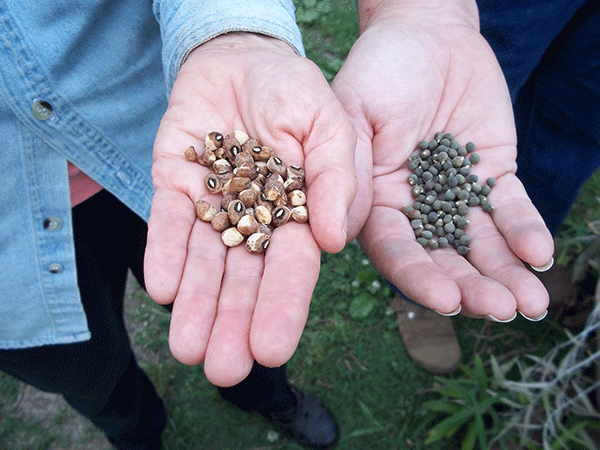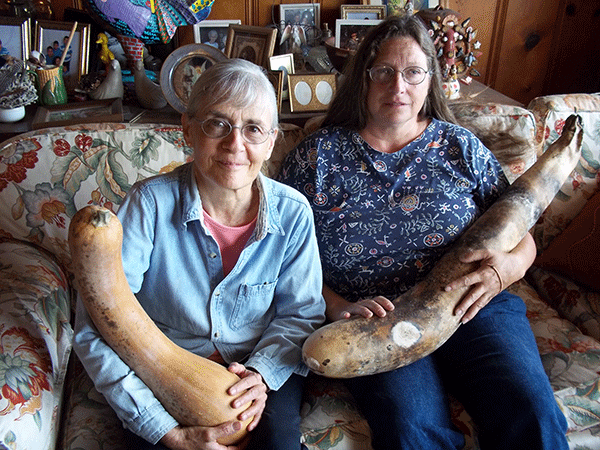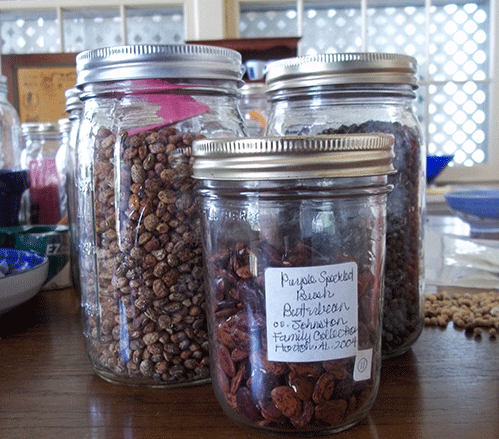
By Gail Allyn Short
Albertville resident Charlotte Hagood says her obsession with heirloom plants began in 1976 when the newly married, former journalist started a small flower garden at her Birmingham home.
Seed sharing had always been a tradition in Albertville where she grew up, she says, and it was during a visit back home when her mother’s next door neighbor gave Hagood a packet of old-time Larkspur seeds.
“You couldn’t get this strain at the store,” says Hagood, “and it was the custom to get seeds from a neighbor and to save your seeds to plant the next year and share them if anybody needed any.”
Since then, Hagood’s passion for old fashioned plants has blossomed into an effort to preserve heirloom produce and flowers. She and longtime friend Dove Stackhouse and her husband, Russell Stackhouse, are the founders of the Sand Mountain Seed Exchange, where since 2006 they have worked to perpetuate and share heirloom seeds that families around Alabama have passed down from generation to generation.
Stackhouse, who with her husband operates the 15-acre Whirlwind Farms in Geraldine, Ala., says she started saving heirloom seeds back in the late 1980s after joining the Seed Savers Exchange, a national, nonprofit organization that saves and shares heirloom seeds across the country.

squash and Dove Stackhouse cradles a Cucuzza squash,
both grown from heirloom seeds.
“I became interested because I’m part Native American,” Stackhouse says, “and I wanted a way to preserve my own food and learn what the natives produced. I wanted to produce it from my same seeds every year because whatever they grew, I knew would be adapted to this country, especially this area, and that it would be the best tasting and easiest to preserve.”
Heirlooms are species of vegetables, fruits and flowers that have been passed down for several generations. They are the plants many Americans once grew and ate such as the Purple Hull Pink Eye and the Blue Goose cowpeas, Black Knight lima beans, Alabama Red okra, Old Virginia tomatoes and the Early Flat Dutch cabbage, a vegetable that was introduced in the United States in the late 1800s, according to the Southern Exposure Seed Exchange online catalogue. The book, The Heirloom Life Gardener, states that more than 100,000 different kinds of heirlooms exist worldwide.
Heirloom flowers and produce are not commonly found in most stores and backyard gardens today. That is because many large agribusiness companies have opted to breed hybrid and genetically modified plants. Hybrids and GMO plants generally produce higher yields and are more durable so foods can be packaged, shipped and stored on grocery shelves and in homes for longer periods of time. In addition, many seed companies no longer sell the old-time varieties, Hagood says.
Hagood and Dove Stackhouse say that before they met, they each became interested in finding and keeping heirloom seeds and began attending seed saving conferences. After meeting at one conference in 2000, Hagood says they struck up a friendship and started comparing their seed collections.

“Once [Dove] saw my seed collection in a couple of refrigerators that were packed with quart and pint jars full of seeds, she said, ‘you have more seed than you will ever be able to maintain yourself. So I’ll help you organize and start getting the seeds out into the community,’” Hagood says.
“The Sand Mountain Seed Bank was founded as a way to not just collect seeds and get stories about seeds, but to get them back out into the community so other people could grow them,” Hagood says.
Until 2010, the Sand Mountain Seed Exchange had a paid membership where people could order heirloom seeds through the mail, Hagood says. Today, because of their schedules, Hagood and the Stackhouses mostly grow heirloom plants on their properties and trade the seeds at festivals and at seed exchanges around the state.
They also meticulously document their seed collections. So far, Hagood and Stackhouse say they have harvested, processed and catalogued close to 300 varieties of heirloom seeds from around Alabama, including seeds for heirloom tomatoes like the Jeff Davis, Cucuzza squash, Cherokee Trail of Tears beans, October beans, which is an heirloom variety once commonly grown in the Appalachians, and nearly 20 varieties of summer peas.
Among the hardest heirloom seeds to find in their collection are the citron melon seeds, especially those from south Alabama, Stackhouse says.
“The citrons were the ones slaves often planted in the cotton rows to refresh themselves,” she says. “But now cotton is so heavily sprayed that they’re getting harder to find just growing wild out there.”
The process of harvesting and preserving heirloom seeds varies with each kind of plant, Stackhouse and Hagood say. The seeds, however, have to be dried before placing them in Mason jars for storage in the refrigerators or freezers.
For every batch of seeds they receive or purchase, they write down the names of the seeds, the dates they obtained them and the names of the families that originally grew the plants. Hagood and Stackhouse say they also record when they plant the heirloom seeds in their own gardens.
The work, says Hagood and Stackhouse, is the best way they know how to help protect, preserve and remember a part of Alabama’s agrarian history.
“It was a choice of either figuring out how to send it to the next generation or it dies,” says Stackhouse. “We couldn’t let it die.”




